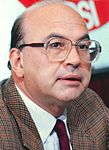1979 Italian Senate election in Lombardy
| |||||||||||||||||||||||||||||||||||||||||
All 48 Lombard seats to the Italian Senate | |||||||||||||||||||||||||||||||||||||||||
|---|---|---|---|---|---|---|---|---|---|---|---|---|---|---|---|---|---|---|---|---|---|---|---|---|---|---|---|---|---|---|---|---|---|---|---|---|---|---|---|---|---|
| |||||||||||||||||||||||||||||||||||||||||
| |||||||||||||||||||||||||||||||||||||||||
Lombardy elected its eighth delegation to the Italian Senate on June 3, 1979. This election was a part of national Italian general election of 1979 even if, according to the Italian Constitution, every senatorial challenge in each Region is a single and independent race.
The election was won by the centrist Christian Democracy, as it happened at national level. Seven Lombard provinces gave a majority or at least a plurality to the winning party, while the agricultural Province of Pavia and Province of Mantua preferred the Italian Communist Party.
Background
[edit]For the first time the Italian Communist Party lost votes, after a period of terroristic attacks by the Red Brigades. Even the far-right Italian Social Movement was weakened. Between other minor parties, the Radical Party obtained its first seat.
Electoral system
[edit]The electoral system for the Senate was a strange hybrid which established a form of proportional representation into FPTP-like constituencies. A candidate needed a landslide victory of more than 65% of votes to obtain a direct mandate. All constituencies where this result was not reached entered into an at-large calculation based upon the D'Hondt method to distribute the seats between the parties, and candidates with the best percentages of suffrages inside their party list were elected.
Results
[edit]| Party | votes | votes (%) | seats | swing |
|---|---|---|---|---|
| Christian Democracy | 2,117,789 | 40.7 | 21 | = |
| Italian Communist Party | 1,530,781 | 29.4 | 15 | |
| Italian Socialist Party | 620,900 | 11.9 | 6 | = |
| Italian Democratic Socialist Party | 217,704 | 4.2 | 2 | |
| Italian Social Movement | 186,412 | 3.6 | 1 | |
| Italian Republican Party | 162,090 | 3.1 | 1 | = |
| Italian Liberal Party | 156,745 | 3.0 | 1 | = |
| Radical Party | 154,257 | 3.0 | 1 | |
| Others | 63,291 | 1.2 | - | = |
| Total parties | 5,209,969 | 100.0 | 48 | = |
Sources: Italian Ministry of the Interior
Constituencies
[edit]- No senator obtained a direct mandate. Please remember that the electoral system was, in the other cases, a form of proportional representation and not a FPTP race: so candidates winning with a simple plurality could have (and usually had) a candidate (usually a Christian democrat) with more votes in their constituency.
Substitutions
[edit]- Ambrogio Colombo for Abbiategrasso (36.3%) replaced Mario Pedini in 1980. Reason: resignation.
- Vincenzo La Russa for Rho (34.6%) replaced Ferdinando Truzzi in 1981. Reason: resignation.
- Angelo Cordara for Pavia (34.1%) replaced Giovanni Marcora in 1983. Reason: death.



